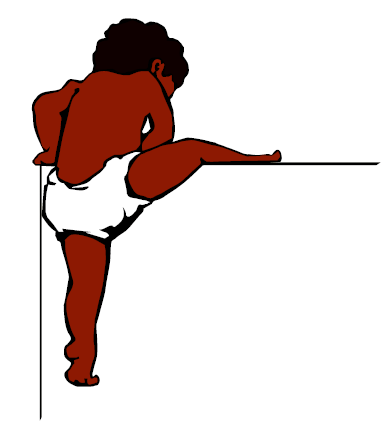Introduction
A toddler’s life, ages 12 to 36 months, is a time of amazing learning and development. Remember that every child is unique and will develop at his own pace.
Use these milestones as a guideline to gauge how your toddler is growing and acquiring new skills. If you think your child has a developmental delay or a disability, schedule a check-up with your pediatrician.

I'm a Toddler and Look What I Can Do!
From 12 to 18 months, I may:
- Stand alone.
- Sit down from a standing position.
- Like to push, pull and dump things.
- Pulls off hat, sock or mittens.
- Turn pages in a book.
- Stack several blocks.
- Wave good-bye.
- Clap hands.
- Put everything into my mouth.
- Experiment with biting people.
- Not understand “breakable.”
- Roll a ball to an adult on request.
- Enjoy flushing toilet.
- Love closing doors.
- Say 8-20 words mom can understand.
- Ask for something by pointing or using one word.
- Identify objects in a book.
- Play peek-a-boo.
- Take things apart.
- Understand and follow simple 1-step directions.
- Look at person talking.
- Enjoy being held and being read stories.
- Like to hand objects to mom or dad.
- Play alone on floor with toys.
- Recognize myself in mirror or photos.
- Imitate others, especially coughing, sneezing, or making animal sounds.
- Enjoy an audience and applause.
- Become upset when separated from parent.
- Enjoy adult attention.
- Get into everything and need constant supervision.
- Put objects in a container.
- Enjoy exploring.
- Feed self, using utensils.
- Have trouble sharing.
- Dart and dash very quickly.
- Reach and try to touch everything.
From 18 to 24 months, I may:
- Walk well.
- Like to run but can’t always stop and turn without some trouble.
- Feed self with spoon.
- Walk up steps with help.
- Toss or roll a large ball.
- Help wash hands.
- Open cabinets, drawers and boxes.
- Use two to three-word sentences.
- Know several hundred words.
- Like to choose between two objects.
- Enjoy singing familiar songs.
- Talk to myself with expression.
- Have difficulty sharing.
- Have favorite words such as “no,” “me” and “mine.”
- Want things NOW.
- Have temper tantrums.
- Get angry sometimes.
- Generally be unable to remember rules.
- Often get physically aggressive when frustrated.
- Slap or hit when I don’t get my way.
- Respond to correction.
- Like to imitate.
- Act shy around strangers.
- Try to do many things by myself.
- Show sympathy to other children.
- Jump but fall often.
- Push and pull objects while walking.
- Bend over and pick up toys.
- Stand on one foot unsteadily.
- Scribble with a crayon.
- Pick up two small toys in one hand.
From 24 to 36 months, I may:
- Want to do more, try new things.
- Get angry if you get in my way.
- Get frustrated when I can’t do things like button my own button.
- Have tantrums.
- Like to use the word “no.”
- Like to learn new things “by myself.”
- Test everything: rules, your limits, my own skills.
- Be ready to start potty training.
- Have accidents after potty training.
- Ride a tricycle.
- Repeat common rhymes.
- Name at least one color correctly.
- Help with simple household tasks.
- Play alongside others more than with them.
- Open door by turning knob.
- Scribble with circular motion.
- Climb on play equipment, slide and ladders.
- Stand on one foot without support.
- Draw or copy vertical lines.
- Speak and be understood most of the time.
- Dress self with help.
- Walk up and down stairs.
- Be able to stoop and squat.
- Enjoy simple stories, rhymes, etc.
- Hum and try to sing.
- Enjoy looking at books.
- Repeat words and use short sentences.
- Not be able to sit still for long.
- Have a sense of humor.
- Be easily frustrated.
- Need time to change activities.
- Be demanding.
- Be persistent.
- Not have the ability to express myself.
- Learning eye-hand coordination.
- Be developing depth perception.
- Be affectionate.
- Still love to be held and cuddled.
Resources
- Byington, Teresa. (1998). Child Development: Understanding the First Five Years. Curriculum: Utah State University Extension.
- Kock, J., Agao, V., Sigman-Grant, M., Martin, S., Reilly, J., Weigel, D., Bixler, M., & Papa, M. (2005). Follow My Lead: Developmentally Appropriate Physical Activities for Young Children. Curriculum Material-05-13, University of Nevada, Reno Cooperative Extension.
- P.E.P. Post. (2006). Developmental Milestones. Volume 9, Issue 2, Las Vegas, NV.
- National Network for Child Care, Ages and stages. Oesterreich, L. Iowa State University.
- Popkin, Michael. (1996). 1, 2, 3, 4 Parents:Parenting Children Ages 1 to 4. Active Parenting Publishers, Atlanta, Georgia.
Kock, J.
2006,
Developmental Milestones for Toddlers,
Extension | University of Nevada, Reno, FS-06-78


